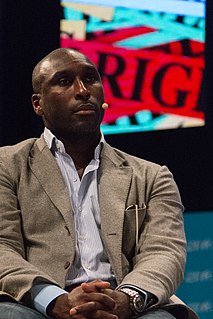A Quote by Alice Walker
What I am really interested in is that I want people to be thinking in other ways - to stop thinking they have to remain glued to a system that has failed and to ideas about society that's necessarily about being run by Democrats or Republicans.
Related Quotes
In Pakistan, many of the young people read novels because in the novels, not just my novels but the novels of many other Pakistani writers, they encounter ideas, notions, ways of thinking about the world, thinking about their society that are different. And fiction functions in a countercultural way as it does in America and certainly as it did in the, you know, '60s.
When we are not engaged in thinking about some definite problem, we usually spend about 95 percent of our time thinking about ourselves. Now, if we stop thinking about ourselves for a while and begin to think of the other person's good points, we won't have to resort to flattery so cheap and false that it can be spotted almost before it is out of the mouth.
I tend to learn things physically - I guess it's my dance training. I never want to make too many choices too soon - so, while I am thinking about the character and thinking about her history, which is very vague in terms of what is given in the text, I am starting to have ideas about what her home is.
When I'm shaving, I'm thinking about what I need to accomplish that day. If it's game day, I'm thinking about schemes, thinking about my matchup for that game. If it's practice, I'm thinking about what film we're going to watch. Or if it's a recovery day, I'm thinking of what body parts are aching and what I want to work on.
Spaces of liberation are, in a certain way, some kind of social spaces where people can not only get together and think about something else, but also act together. If you are thinking about an elemental solidarity, you are thinking about people acting together and taking decisions together, and thereby beginning to think about what sort of society they want to create. So, there is a need for liberated spaces; that is really difficult.
One of the basics of a good system of innovation is diversity. In some ways, the stronger the culture (national, institutional, generational, or other), the less likely it is to harbor innovative thinking. Common and deep-seated beliefs, widespread norms, and behavior and performance standards are enemies of new ideas. Any society that prides itself on being harmonious and homogeneous is very unlikely to catalyze idiosyncratic thinking. Suppression of innovation need not be overt. It can be simply a matter of peoples walking around in tacit agreement and full comfort with the status quo.







































